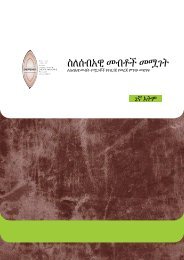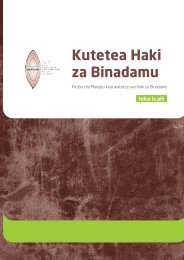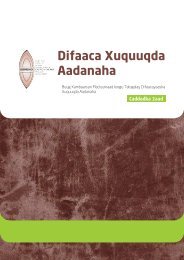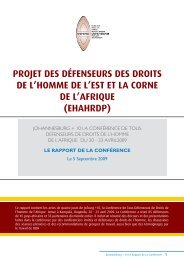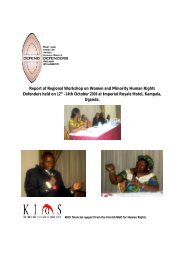English PDF - East and Horn of Africa Human Rights Defenders ...
English PDF - East and Horn of Africa Human Rights Defenders ...
English PDF - East and Horn of Africa Human Rights Defenders ...
Create successful ePaper yourself
Turn your PDF publications into a flip-book with our unique Google optimized e-Paper software.
Conference Report: Resources <strong>and</strong> Proceedings 21clans. The increase in the number <strong>of</strong> media outlets has corresponded withthe arrival on the labour market <strong>of</strong> a generation <strong>of</strong> journalists, unskilled ineither the basics <strong>of</strong> the pr<strong>of</strong>ession or its ethical requirements.However, this increase has not led to greater pluralism, as journalists havetended to target the same small market, cover the same type <strong>of</strong> issues in thesame way, <strong>and</strong> strive to match the real or alleged expectations <strong>of</strong> the public.The majority <strong>of</strong> the media institutions in the country are privately-owned.Business people own over 64 newspapers (mostly A4-sized as newsletters)<strong>and</strong> 17 FM radio stations. Countless websites are daily visited by manySomali people in the diaspora as well as in the country. But most <strong>of</strong> the© EHAHRDPwebsites are mouthpieces <strong>of</strong> different clans.Infringements <strong>of</strong> media freedom in Somalia have been unprecedented inthe year 2006. Multiple pressures including the use <strong>of</strong> intimidation <strong>and</strong> detention based on falseallegations, self-censorship, propag<strong>and</strong>a <strong>and</strong> suppression <strong>of</strong> the truth have been the major features<strong>of</strong> the onslaught on the rights <strong>and</strong> freedoms <strong>of</strong> the media. Press freedom is further undermined bymedia workers’ poor social conditions.The number <strong>of</strong> <strong>of</strong>fences against journalists <strong>and</strong> media businesses in 2006 were roughly the sameas in 2005; however more substantial perils such as threats to journalists’ lives because <strong>of</strong> theirwork were monitored by the members <strong>of</strong> Press Freedom Protectors Group working with thebacking <strong>of</strong> the National Union <strong>of</strong> Somali Journalists (NUSOJ).During this year, a range <strong>of</strong> sophisticated measures have been used to curb media freedom. Somepoliticians verbally or tactically intimidate journalists while some were put in custody for shortperiods.Current state <strong>of</strong> media freedomThe most recent case involving harassment <strong>of</strong> journalists occurred at the end <strong>of</strong> October, whenthree journalists were arrested by forces loyal to the Transitional Federal Government in Baidoa.The three; Fahad Mohammed Abukar <strong>of</strong> Warsan Radio in Baidoa, Mohammed Adawe Adam <strong>of</strong>Shabelle Radio in Mogadishu <strong>and</strong> Muktar Mohammed Atosh <strong>of</strong> <strong>Horn</strong>Afrik Radio in Mogadishuwere reportedly arrested while returning back to Baidoa, from their trip to Burhaka wherefighting had been on <strong>and</strong> <strong>of</strong>f between Government troops <strong>and</strong> the militias loyal to the IslamicCourts Union. The journalists were in a while released after a week <strong>of</strong> detention <strong>and</strong>investigations.In March, journalist Hassan Kafi Harred <strong>of</strong> Radio Banadir was briefly detained at Baidoa policestation by militias loyal to the Rahanweyn Resistance Army. Security forces in Baidoa brieflydetained Ms. Maryan Mohammud Qalanjo, one <strong>of</strong> Radio Shabelle’s Baidoa correspondents,striking her with their rifle butts. She was later released <strong>and</strong> told she was banned from working asa journalist. In June, the newly established temporary leadership <strong>of</strong> Middle Shebelle region jailedAbdikarin Omar Moallim, the regional reporter <strong>of</strong> Radio Banadir, overnight.The editor <strong>of</strong> widely-read daily newspaper Jamhuuriya, Mohammed Abdi Urad, was arrested inHargeisa by soldiers from Somalil<strong>and</strong> Criminal Investigation Department after a warrant for hisarrest was issued by the Hargeisa regional court on 18 June. Journalists Mohammed Adawe <strong>and</strong>Ali Ajey <strong>of</strong> Radio Shabelle were briefly arrested on 18 June by the security committee <strong>of</strong> Baidoatown on the orders <strong>of</strong> the Minister <strong>of</strong> Farming who was at the same time the acting Minister <strong>of</strong>Interior <strong>of</strong> the Transitional Government, Colonel Hassan Mohammed Nur (Shatigudud).



